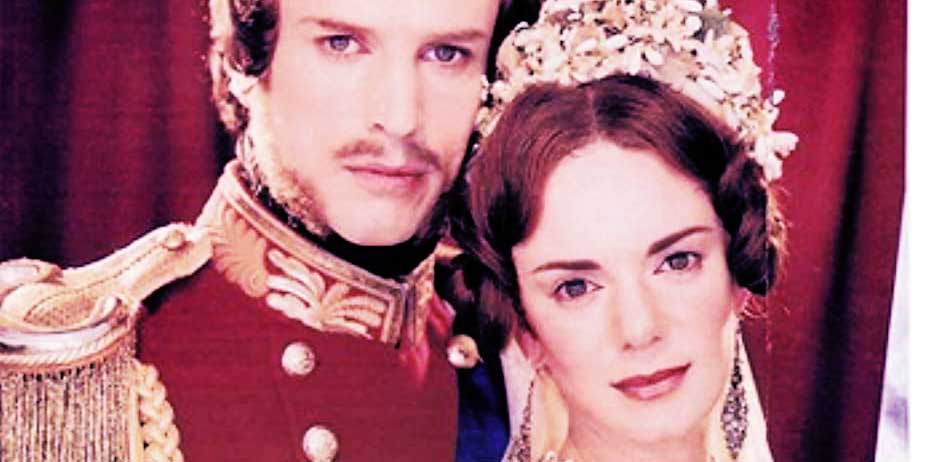Victoria and Albert (2001)
Victoria (Victoria Hamilton) lives a cloistered life in Kensington Palace, far removed from her uncle (the current King of England) and under the influence of her ambitious and overbearing mother. Family alliances are attempting to place her together with her cousin, Prince Albert of Germany. The foremost pursuer of this attachment is "Stocky" (David Suchet), a long-time adviser to her German cousins. Unfortunately at her young age Victoria shows much disinterest in Albert and is even prone to teasing him. And thus the plans are temporarily thwarted and the German cousins return home, Albert (Jonathan Firth) none the worst for wear. Shortly after Victoria's coming-of-age, the King dies and she is promoted to wear the crown. The young monarch instinctively shrinks back for fear of failure but under the gentle prodding of her lifelong governess and companion, begins to tentatively spread her wings and fly. A rebellion against the strict regulations of her mother is the first thing to be attacked and Victoria begins to sever the cords one by one that have held her trapped for so long. Her first true relationship of trust and respect is made in the form of the grandfatherly adviser, Lord Melbourne, and under his hand she becomes the queen that England so proudly governed. Stocky once again attempts to bring Albert and Victoria together, but is refused to be seen in the British court.
Thus he provokes the King of Germany to pay his niece a visit, and the result is that she warily issues an invitation to her cousins. "I have decided never to marry!" she informs Lord Melbourne confidently, but that assurance wavers and dies when she is reintroduced to the now-dashing Prince Albert. Tentatively the two are thrown into a whirlwind romance, but this is merely the beginning. Together, like oil and water, their politics, personal beliefs, and moral standards would collide. And together they would shape an empire. The BBC has become extremely well known for their lavish costume dramas, and Victoria & Albert is no exception. It merely provides a framework for some very excellent performances by all involved. The myth and secrecy that has surrounded Queen Victoria's life has been shattered by this mixture of fact and fantasy, turning a quiet monarch into a personable and extremely likable young queen. The film begins at a lethargic pace but swiftly picks up and the momentum carries it well into part two, where there it falters.
As a lover of "happy endings," I loss my deep love for the film when they began to delve into the period after Victoria began to instate her husband into a higher position at court. To me watching the characters grow old and fat -- and even die -- was painful, and the ending is somewhat somber.
Prince Albert believes in faithfulness in marriage, mainly due to the fact that his own family life was shattered due to an unfaithful father. He insists that as the most watched monarchs in the world, they must set an example for the Empire... and demands that the member of court imprudently unfaithful to his wife beneath their very roof be dismissed. He attempts to patch up the past between Victoria and her mother; he refuses to leave her during childbirth, while a cabinet member remarks callously, "He should be at his club!" Likewise, many valuable lessons in compassion, courage, and nobility are shown in the deeds and works of both king and queen. The cast is stunning, the music memorable, with enough adventure to cure the lull. Passion runs through every frame, from the violent outbursts of an angry queen to the temperamental flairs that often perk between the married couple. It is a deeply moving period piece that will give you a glimpse into the life of Queen Victoria.
Sexual Content:
Several paintings
featuring topless women are seen in the background of various
early shots; later, Victoria shyly asks her lady-in-waiting what
will be expected of her on her wedding night. (Lady Henrietta
merely blushes and skirts the issue). Several shots find Albert
and Victoria snuggling in the night, bare shoulders showing.
Victoria's eldest son goes to a bawdy program in which
cleavage-bearing women flaunt themselves suggestively (but
without nudity); he later goes to the room of one and a scandal
arises from it. By far the most objectionable scene comes when
Albert is chasing a child intruder through the palace and bursts
in upon a member of court cavorting with his mistress. While
both are clothed and the scene doesn't linger, it leaves no
question as to what was going on.

